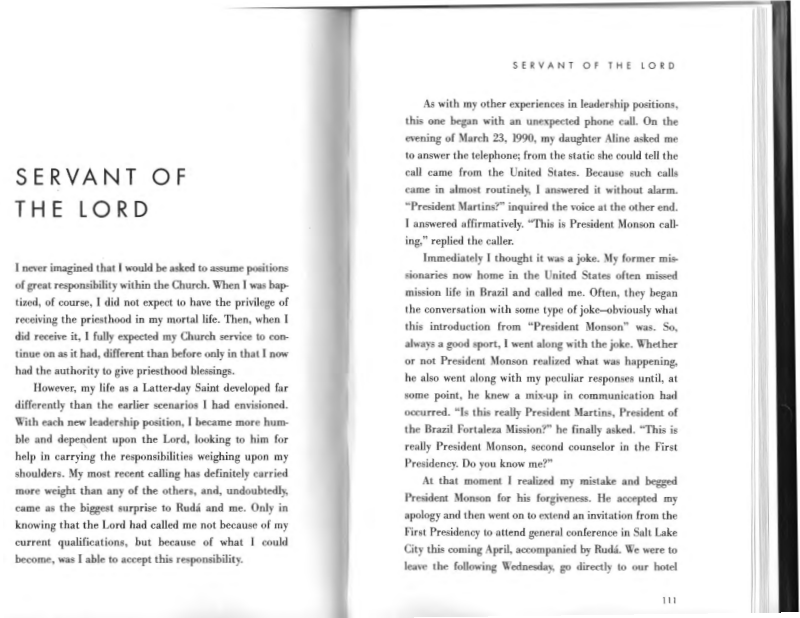Helvécio Martins describes experiences leading up to his call as a Seventy.
- Type
- Book
- Source
- Helvécio Martins LDS
- Hearsay
- Direct
- Reference
Helvécio Martins and Mark Grover, The Autobiography of Elder Helvécio Martins (Salt Lake City, UT: Aspen Books, 1994), 111–113
- Scribe/Publisher
- Aspen Books
- Audience
- General Public
- Transcription
As with my other experiences in leadership positions, this one began with an unexpected phone call. On the evening of March 23, 1990, my daughter Aline asked me to answer the telephone; from the static she could tell the call came from the United States. Because such calls came in almost routinely, I answered it without alarm. "President Martins?" inquired the voice at the other end. I answered affirmatively. "This is President Monson calling," replied the caller.
Immediately I thought it was a joke. My former missionaries now home in the United States often missed mission life in Brazil and called me. Often, they began the conversation with some type of joke—obviously what this introduction from "President Monson" was. So, always a good sport, I went along with the joke. Whether or not President Monson realized what was happening, he also went along with my peculiar responses until, at some point, he knew a mix-up in communication had occurred. "Is this really President Martins, President of the Brazil Fortaleza Mission?" he finally asked. "This is really President Monson, second counselor in the First Presidency. Do you know me?"
At that moment I realized my mistake and begged President Monson for his forgiveness. He accepted my apology and then went on to extend an invitation from the First Presidency to attend general conference in Salt Lake City this coming April, accompanied by Rudá. We were to leave the following Wednesday, go directly to our hotel upon arrival, and not go out too much. In taking these steps, he explained, we would avoid fueling speculation about why we were there by those who might recognize us.
After I told Rudá about President Monson's invitation and instructions, we wondered if this type of invitation to attend general conference could be a normal practice. When Rudá worried, I tried to distract her, suggesting that maybe we had done something so terribly wrong in Fortaleza that the First Presidency had called us to Salt Lake for a formal reprimand. This brought a laugh from Rudá. This little joke helped us maintain a semblance of control during the days of ambiguity leading up to our departure in late March. When we arrived at the Salt Lake Airport, we were met by an escort who took us to a hotel near Temple Square.
The day that followed was one of the most wonderful and difficult days of our lives. We nervously arrived at President Monson's office for an afternoon appointment. There, he graciously put us at ease—until he began the interview. During that meeting, President Monson told us something we never, never expected to hear: the prophet and First Presidency of the Church had called me to be a member of the Second Quorum of the Seventy, for the next five years.
All that Rudá and I could do was cry. I could not find any other words to say to President Monson except, "Why me?" I felt uneasy and unworthy. When President Monson asked whether I was willing to accept the call, I mentioned my inadequacies for this type of position. But I also remembered Nephi's declaration that the Lord does not give commands or calls without providing a way to complete the work. I believed in the Lord and humbly accepted the call. President Monson congratulated and embraced us, again counseling us to remain silent. So, we returned to our hotel and stayed there.
The B. H. Roberts Foundation is not owned by, operated by, or affiliated with the Church of Jesus Christ of Latter-day Saints.

